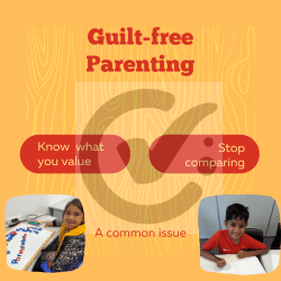Struggling with working parent guilt? Thoughts from Jean
The guilt of being a working parent can be overwhelming, and it's made even worse when your child is struggling at school. You want to do parenting 'right' and make the best possible decisions for your child but often nothing you do feels like it's enough.
You're not alone.
"Working parent guilt" is common but not often spoken about (most likely because people think like they should have the parent-work situation sorted).
The truth is, raising children takes time and money, and that perhaps best sums up the conflict parents feel that leads to the guilt.
The time-money conflict
In deciding to go back to work, you trade time with your child, for money. If you don't work, you have time but there's less money and potentially less opportunities for your child.
And therein lies the conflict.
Whatever choice you make, you're likely to experience what Jean McKenzie, founder of Impact Tutoring, refers to as an "internal juggle".
"Parents are trying to do the right thing but no matter what they choose, it doesn't feel enough because something gets sacrificed".
As a working parent, Jean knows the conflict first-hand. And as an educator, she knows that being a working parent doesn't necessarily impact your child as much as you think.
Parents blame themselves
There are a range of reasons why children struggle at school - anything from the way information is taught not matching their learning style, the pace at which information is shared, the relationship they have with the teacher, how much time is spent practising what is learnt and more.
But despite sharing those reasons, Jean finds parents still blame themselves when their child is struggling.
"When your child is struggling, it's understandably a really emotional time because you want the best for them. But get caught up in blaming yourself makes it's harder to see what's going on for your child."
To help your child best, you need to know what's going on for them and talking with your child's teacher or someone at their school, or an educator like Jean, can help you with that.
How to resolve the time-money conflict
So, how do you resolve the time-money conflict and reduce the "internal juggle"?
There's no one-size-fits-answer to that question because it depends on you and your specific situation.
In choosing what to do, Jean offers these 3 pieces of advice:
1. Avoid comparing yourself and your choices to other parents.
It’s tempting to look at what other parents, either ones you know or those you see online, are doing and judge yourself harshly. But as Jean says, "You're not them and they're not you - the best choice will always be the one that's right for you, your child, and family/whanau."
2. Understand what's important to you.
Time and money (and the opportunities it provides) are often seen as separate things and that you can’t have both, but that’s not necessarily the case. Ask yourself if one is more important to you than the other? If both are important, what does that look like?
3. Make decisions based on what you value.
There's no guidebook that lays out step-by-step instructions for parenting - we're all doing the best we can! Back yourself to make the best decision you can based on what’s important to you. (and know that you can make a new decision at any time).
Will the guilt and that 'internal juggle' ever go away completely? You're probably hoping the answer we give you is "yes”, but we want to be honest (and we know you value that).
It's possible to lessen the guilt you feel and the best way to do that is to avoid comparing yourself and your decisions to others, and to focus on what is right for you, your child, and family/whanau.




